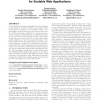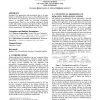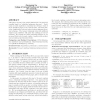120
Voted
WWW
2007
ACM
16 years 3 months ago
2007
ACM
Generic database replication algorithms do not scale linearly in throughput as all update, deletion and insertion (UDI) queries must be applied to every database replica. The thro...
119
Voted
WWW
2007
ACM
16 years 3 months ago
2007
ACM
Master data refers to core business entities a company uses repeatedly across many business processes and systems (such as lists or hierarchies of customers, suppliers, accounts, ...
105
Voted
WWW
2007
ACM
16 years 3 months ago
2007
ACM
This paper describes a kernel based Web Services (abbreviated as service) matching mechanism for service discovery and integration. The matching mechanism tries to exploit the lat...
135
Voted
WWW
2007
ACM
16 years 3 months ago
2007
ACM
The Web is rapidly moving towards a platform for mass collaboration in content production and consumption. Fresh content on a variety of topics, people, and places is being create...
115
Voted
WWW
2007
ACM
16 years 3 months ago
2007
ACM
Comparing and contrasting is an important strategy people employ to understand new situations and create solutions for new problems. Similar events can provide hints for problem s...
98
Voted
WWW
2007
ACM
16 years 3 months ago
2007
ACM
In this paper we analyze the Web coverage of three search engines, Google, Yahoo and MSN. We conducted a 15 month study collecting 15,770 Web content or information pages linked f...
134
Voted
WWW
2007
ACM
16 years 3 months ago
2007
ACM
Enriching Web applications with personalized data is of major interest for facilitating the user access to the published contents, and therefore, for guaranteeing successful user ...
107
Voted
WWW
2007
ACM
16 years 3 months ago
2007
ACM
Open information spaces have several unique characteristics such as their changeability, large size, complexity and diverse user base. These result in novel challenges during user...
97
Voted
WWW
2007
ACM
16 years 3 months ago
2007
ACM
Web pages are more than text and they contain much contextual and structural information, e.g., the title, the meta data, the anchor text, etc., each of which can be seen as a dat...
108
Voted
WWW
2007
ACM
16 years 3 months ago
2007
ACM
This paper reports a new general framework of focused web crawling based on "relational subgroup discovery". Predicates are used explicitly to represent the relevance cl...




